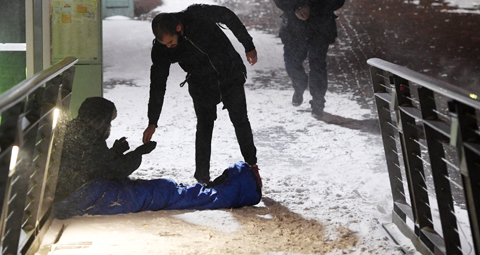BY Ryan McDougall | February 1 2019 | ![]() 0 COMMENTS
0 COMMENTS ![]() print
print

Archbishop says we must ‘wake-up’ to homelessness crisis, as he calls for combined efforts to address the problem
Publication Date: 2019-02-01
Scale of Scotland's homelessness problem, which sees at least one homeless person die every month, underlined by heartbreaking story of man living on the streets who was forced to give up his pet dog to survive
A MAN living on Glasgow’s streets has told of his struggle to find support amid a hostile and drug-rife city.
Michael James Barclay, 33, has lived on the streets for the past month after his relationship of 10 years broke-down and he has struggled to find help since.
He said he has witnessed the city’s homelessness crisis grow and many safe havens for rough sleepers shut down.
“I’ve never seen it as bad as it is,” he said.
His comments come as new figures showed the shocking scale of the problem, with a two per cent rise in homelessness nationally and statistics showing that one homeless person dies each month on average in Glasgow.
The figures have prompted the Archbishop of Glasgow to call for society to wake-up to the problem and engage in a coordinated effort to tackle the issue.
Bi-annual homelessness stats released by the Scottish Government this week also revealed that there were 1,850 unsuccessful applications for temporary accommodation from April to September 2018, the majority of which were in Glasgow.
Deaths
Mr Barclay, a father, lives on the streets of Glasgow with his dog Mitch, and said he has struggled to find help from charities and temporary accommodation from the council.
“They’ll say there’s no accommodation available, but there is,” Mr Barclay said.
“That’s three of my pals who have died now. One was found in a tent two weeks ago, and my friend Matthew died two years ago from the coldness.”
Mr Barclay also believes temporary accommodation is often unsafe.
“They can put people up in temporary accommodation, and that’s fair dues but there’s a lot violence and such in these places,” he said.
He added that many charities have refused him shelter because of his dog, forcing him to give up his loyal companion.
“I’ve managed to talk my pal into taking him, so if I don’t manage to get in somewhere at least I know he’ll be all right. He’s fed more than I am—I make sure he’s eaten first before myself,” he said.
Archbishop Philip Tartaglia of Glasgow said the fact that a homeless person dies in Scotland at least once a month is ‘truly shocking’ and called for action to combat the problem.
“This should serve as a wake-up call to all of us to look out for the homeless, especially in these times of extreme cold,” he said.
“As individuals we can bring warmth to a homeless person’s spirit by engaging with them and helping them with a donation, but the wider problem can only be solved by good, joined-up policy-making between local and national government.”
Addiction
As well as the cold conditions, it has been revealed that ‘street valium’ has contributed to the number of homeless deaths, and Mr Barclay believes that it and other substances are reasons why many of the city’s homeless aren’t receiving help.
“It’s murder,” he said, frustrated, believing many people deliberately become homeless in order to raise money for drugs.
He added: “Fair enough, I have a wee drink here and there, but I don’t take drugs. Some of them are into [valium] and heroin and stuff.”
Mr Barclay understands that many of these people come from tough backgrounds, but believes homeless people who don’t use drugs are often tarred with the same brush, making it harder for them to receive help.
Many Scottish charities are in agreement that addressing addiction is key to combating the issue.
The Wayside Club, a Catholic charity run by the Legion of Mary, is open every evening for the city’s homeless, where they can get showered, fed and enjoy company.
Secretary Jim White has been involved with the club for over 60 years, and believes the situation has worsened.
Mr White said: “When I first went up to The Wayside 60 years ago I used to have a busy night with 12-13 people. Now I’ve got 70 some nights.
“Ever since I’ve been here there’s been deaths—they can’t do anything about it until they’ve solved the problems. The drink, the drugs, the lack of mental health support: there’s so many issues that don’t get tackled the way they should.”
Mr White added that while there is a need for temporary accommodation, it often doesn’t solve the problem due to the issues faced by many of the homeless community.
He added: “There’s no simple solution. To put these guys in a house—some will manage to progress, but if you’ve got a drinking or gambling problem it’s not as easy as that.”
Grant Campbell, chief executive of Christian homelessness charity Glasgow City Mission, said that ‘chaotic drug use is sometimes a barrier to benefitting from the accommodation and support that the individual needs.’
“This can either be because the individual refuses the support, or the support comes with conditions of abstinence or treatment the individual doesn’t want,” he said, stressing that ‘Glasgow needs solutions which are welcomed by those that need them.’
Graeme Brown, director of Shelter Scotland, said local and national governments must take ‘urgent action’ to address homelessness, citing an upcoming budget as ‘an opportunity for the Scottish Government to ensure councils are properly resourced to deal with this unacceptable rise in homelessness in Scotland.’
Action plan
Kevin Stewart, the Scottish Government Minister for Local Government, Housing and Planning, said that there has been a decrease in the number of homeless applications, having dropped by 40 per cent since 2008.
He added that 78 per cent of homeless people have been placed in temporary accommodation as a legal right.
“We are clear that one person being made homeless is one too many, particularly in households which include children,” he said.
“That is why we have established a £50 million fund and published an action plan which takes forward the 70 recommendations from our Homelessness and Rough Sleeping Action group.
“We know that for some people, particularly those with multiple complex needs and those most at risk of rough sleeping, effective support for their wider needs is as important as a settled home.
“So we are pursuing a shift towards getting a person into settled accommodation first, so they can then access support from the security of their own home.”










